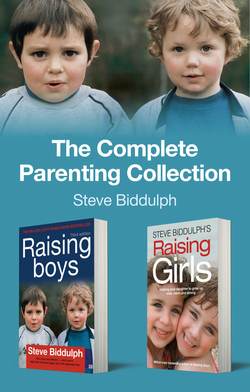Читать книгу The Complete Parenting Collection - Steve Biddulph, Steve Biddulph - Страница 51
PRACTICAL HELP LEARNING TO COMMUNICATE
ОглавлениеCommunication is essential to life. Yet sadly, in every classroom, there are usually four or five children who can’t read, write or speak well. And among these children, boys outnumber girls by four to one! This is now thought to be the result of boys’ brains not being quite so well organised for language.
But there is no need to just let this be. If you want to prevent your child having learning or language problems, there is a lot you can do to help, according to neuroscientist Dr Jenny Harasty. Dr Harasty and her team found that in females, two regions of the brain dedicated to handling language are proportionately 20 percent to 30 percent larger than in males. But no-one knows whether these regions are larger at birth or because girls get more practice at using them, causing them to grow. Whatever the cause, we do know that the brain is very responsive to learning experiences if these are given at the right age. And for language, that age is zero to eight. In adolescence and adulthood we go on learning, but the older the child, the harder it is to change that early wiring of the brain.
You can help your boy learn to communicate better, starting right from when he is a baby. This means that he will be a better reader, writer and speaker when he goes to school. Here’s how …
1. ‘TALK THEM UP’ – ONE STEP AT A TIME
Children acquire spoken language one step at a time. Babies under one year of age will begin to babble and gesture very enthusiastically, telling us they are ready to learn verbal communication! This is the time to start to teach them words.
With a baby who babbles, repeat a word that seems to be what he means. Baby says ‘gukuk, baguk!’ and points to his toy duck. You say ‘Ducky! John’s ducky!’ Soon John will be saying ‘Ducky’ too.
With a toddler who says single words, like ‘milk!’, you say a couple of words, such as ‘milk bottle’. This helps him to move on to joining pairs of words together, and so on.
A child who is saying words in twos and threes can be stretched further by imitating you in whole sentences. For example, he says, ‘Gavin truck!’ You reply, ‘Gavin wants a truck? Here’s Gavin’s truck!’ And so on.
In short, kids learn best if you speak back to them one step ahead of the stage they are at. And they love the game – all human beings love to communicate.
2. EXPLAIN THINGS TO CHILDREN EVERY CHANCE YOU CAN
This is a great use of the many times when you are just doing routine things with your children – travelling, doing housework, going for a walk, doing the shopping. Use this time to chatter, to point things out, and to answer questions. Surprisingly, some very loving parents (who care for their kids well) seem not to realise that kids’ brains grow from conversation. Don’t be shy – explain things, tell them stories! For example, ‘You see this lever? This makes the wipers go. They swish the rain away from the window.’ ‘This vacuum cleaner makes a big wind. It sucks the air and pulls the dirt into a bag. Would you like a turn?’
This kind of talk – provided you don’t overdo it and bore your child senseless – does more for your child’s brain than any amount of expensive education later on.
3. READ TO YOUR KIDS FROM AN EARLY AGE
Even when your child is just one year old, you can enjoy books together – especially the kind that have rhymes and repetition. ‘Humpty Dumpty’ and ‘Twinkle Twinkle Little Star’ work just fine. From enjoying them on your knee or snuggled up in bed, children learn to love books, looking at the pictures and enjoying the sound of your voice. You can ‘ham it up’ a little by making funny voices or by being dramatic.
As your child gets to have favourite stories, you can play a ‘predicting’ game: ‘And the little cat went …?’, pausing so your child provides the ‘Miaow!’. Prediction is a very important part of reading. Good readers anticipate what word is coming next.
Remember, whenever you’re playing learning games with kids, the trick is to be playful, making your children ‘stretch’ their minds just a little – which they will love to do.
All kids benefit from these learning games – but for boys it is also a preventive step because of their disposition to be poorer at language if we don’t help them along. And it’s fun to do, anyway!
Dr Jenny Harasty advises that if you have worries about your boy’s speech and language development (if he isn’t talking as well as you think he should), trust your intuition. Speak to a speech therapist from your local hospital or community health centre. Sessions of speech therapy are fun for children and can make all the difference to a good start.
Whether the cause is hormonal or environmental, there is no doubt that these brain differences exist between men and women today. Because of their more connected brain halves, older women who suffer strokes usually recover more speedily and completely than men: they can activate extra pathways to the other half of their brain to do the job of the damaged parts. Girls who have learning problems improve more quickly with tuition for the same reason. And boys are more prone to problems resulting from brain damage at birth, and so on. This may explain the greater numbers of boys with learning difficulties, autism and many other disorders.
